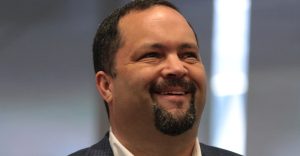National
Police Chief Who Pledged Reforms Fired Amid Crime Spike

In this April 30, 2015, file photo, Baltimore Police Department Commissioner Anthony Batts listens as Deputy Commissioner Kevin Davis speaks at a news conference, in Baltimore. Baltimore Mayor Stephanie Rawlings-Blake announced the firing of Batts in a news release Wednesday, July 8. (AP Photo/Patrick Semansky, File)
JULIET LINDERMAN, Associated Press
BALTIMORE (AP) — Less than three years ago, Anthony Batts was hand-picked by Baltimore Mayor Stephanie Rawlings-Blake to combat crime and reform a troubled law enforcement department in one of America’s most violent cities.
On Wednesday, Batts was fired as police commissioner amid the worst crime spike in the city since the 1970s and plummeting morale among officers who complained their boss was failing to provide the support and leadership they needed to do their jobs.
“We cannot continue to debate the leadership of the department,” Rawlings-Blake told a news conference she called to announce her decision. “We cannot continue to have the level of violence we’ve seen in recent weeks in this city.”
Deputy Police Commissioner Kevin Davis, who has only been with the department since January, will serve as interim commissioner, Rawlings-Blake said.
Batts and Rawlings-Blake are African-American, as is the city’s top prosecutor, Baltimore State’s Attorney Marilyn Mosby. Davis is white. Sixty percent of the city’s population is black, while the police department is 48 percent African-American. Mosby said her office has already met with Davis and she looks forward to working with him.
The firing comes less than three months after the city erupted in riots following the death of Freddie Gray, a 25-year-old black man who died in April of injuries he received in police custody. Six police officers have been criminally charged in Gray’s death. Gray died April 19. Most of the unrest took place on April 27.
The U.S. Justice Department is conducting a civil rights review of the department and Batts announced Tuesday that an outside organization would review the police response to the unrest.
But the Baltimore police union released a scathing post-mortem report Wednesday accusing Batts and other top brass of instructing officers not to engage with rioters and to allow looting and destruction to occur.
“The officers repeatedly expressed concern that the passive response of the Baltimore police commanders to the civil unrest allowed the disorder to grow into full-scale rioting,” Gene Ryan, president of the Baltimore Fraternal Order of Police Lodge 3, wrote in the report. “The riots were preventable.”
In the weeks after the riots, homicides and other violent crimes spiked and arrests began to plummet as word spread that police officers were afraid that they, too, would be charged with crimes if something went wrong during the course of their duties.
Baltimore’s homicide total this year is 156, according to police. That’s a 48 percent increase compared with the same time last year. Shootings have increased 86 percent.
In the latest example, gunmen jumped out of two vans and fired at a group of people a few blocks from an urban university campus Tuesday night, killing three people.
The startling spike stands in stark contrast to Batts’ promise to fight violent crime when he arrived in Baltimore in 2012.
At a swearing-in ceremony in November of that year, Batts pledged to “continue our progress at reducing violent crime and holding accountable those that perpetrate violence in our good streets.”
Batts took over from Fred Bealefeld, who resigned after five years as commissioner and 31 in the Baltimore Police Department. Batts too was a veteran officer, though new to the city of Baltimore: He spent three decades in California, two as commissioner of the embattled Oakland Police Department and seven as commissioner of the Long Beach police department, where he’d served as a law enforcement officer for 20 years.
“I worked closely with Commissioner Batts and always found him open to my ideas for reforming the department,” said Baltimore City Council President Bernard C. “Jack” Young. “He was engaging, experienced, and served our city to the best of his ability.”
But Young said that when he talked recently with citizens and police officers, “it became increasingly clear that a growing lack of confidence in the direction of our city’s crime-fighting strategy had the potential to severely damage the long-term health of our city.”
The Rev. Jamal Bryant, who delivered the fiery eulogy at Gray’s funeral, called Batts’ firing a first step toward healing police-community relations.
“It’s no secret there’s been great strain and stress since the uprising,” he said. “It became not just a disconnect between police and the community but between the police and their commissioner.”
In the Sandtown-Winchester neighborhood of West Baltimore, where Gray was arrested, residents praised the mayor’s decision.
Keonna Stokes, 22, said she was glad to see Batts removed from his position, and hopes a new commissioner will have a lower tolerance for police misconduct.
“The police wouldn’t do the things they do if the commissioner didn’t allow it,” she said. “He should have been fired. We call the police when we really need them, when people hurt us. But now we don’t call them, because they hurt us. If they didn’t, Freddie would still be here.”
Batts’ contract with the city paid him $190,000 and was to run through June 2020. It includes a provision for a severance payment equal to his annual salary if he is terminated without cause.
Copyright 2015 The Associated Press. All rights reserved. This material may not be published, broadcast, rewritten or redistributed.
Alameda County
Seth Curry Makes Impressive Debut with the Golden State Warriors
Seth looked comfortable in his new uniform, seamlessly fitting into the Warriors’ offensive and defensive system. He finished the night with an impressive 14 points, becoming one of the team’s top scorers for the game. Seth’s points came in a variety of ways – floaters, spot-up three-pointers, mid-range jumpers, and a handful of aggressive drives that kept the Oklahoma City Thunder defense on its heels.

By Y’Anad Burrell
Tuesday night was anything but ordinary for fans in San Francisco as Seth Curry made his highly anticipated debut as a new member of the Golden State Warriors. Seth didn’t disappoint, delivering a performance that not only showcased his scoring ability but also demonstrated his added value to the team.
At 35, the 12-year NBA veteran on Monday signed a contract to play with the Warriors for the rest of the season.
Seth looked comfortable in his new uniform, seamlessly fitting into the Warriors’ offensive and defensive system. He finished the night with an impressive 14 points, becoming one of the team’s top scorers for the game. Seth’s points came in a variety of ways – floaters, spot-up three-pointers, mid-range jumpers, and a handful of aggressive drives that kept the Oklahoma City Thunder defense on its heels.
One of the most memorable moments of the evening came before Seth even scored his first points. As he checked into the game, the Chase Center erupted into applause, with fans rising to their feet to give the newest Warrior a standing ovation.
The crowd’s reaction was a testament not only to Seth’s reputation as a sharpshooter but also to the excitement he brings to the Warriors. It was clear that fans quickly embraced Seth as one of their own, eager to see what he could bring to the team’s championship aspirations.
Warriors’ superstar Steph Curry – Seth’s brother – did not play due to an injury. One could only imagine what it would be like if the Curry brothers were on the court together. Magic in the making.
Seth’s debut proved to be a turning point for the Warriors. Not only did he contribute on the scoreboard, but he also brought a sense of confidence and composure to the floor.
While their loss last night, OKC 124 – GSW 112, Seth’s impact was a game-changer and there’s more yet to come. Beyond statistics, it was clear that Seth’s presence elevated the team’s performance, giving the Warriors a new force as they look to make a deep playoff run.
#NNPA BlackPress
LIHEAP Funds Released After Weeks of Delay as States and the District Rush to Protect Households from the Cold
BLACKPRESSUSA NEWSWIRE — The federal government has released $3.6 billion in home heating assistance after a delay that left states preparing for the start of winter without the program’s annual funding.

By Stacy M. Brown
Black Press USA Senior National Correspondent
The federal government has released $3.6 billion in home heating assistance after a delay that left states preparing for the start of winter without the program’s annual funding. The Low-Income Home Energy Assistance Program, known as LIHEAP, helps eligible households pay heating and cooling bills. The release follows a shutdown that stretched 43 days and pushed agencies across the country to warn families of possible disruptions.
State officials in Minnesota, Kansas, New York, and Pennsylvania had already issued alerts that the delay could slow the processing of applications or force families to wait until December for help. In Pennsylvania, more than 300,000 households depend on the program each year. Minnesota officials noted that older adults, young children, and people with disabilities face the highest risk as temperatures fall.
The delay also raised concerns among advocates who track household debt tied to rising utility costs. National Energy Assistance Directors Association Executive Director Mark Wolfe said the funds were “essential and long overdue” and added that high arrearages and increased energy prices have strained families seeking help.
Some states faced additional pressure when other services were affected by the shutdown. According to data reviewed by national energy advocates, roughly 68 percent of LIHEAP households also receive nutrition assistance, and the freeze in multiple programs increased the financial burden on low-income residents. Wolfe said families were placed in “an even more precarious situation than usual” as the shutdown stretched into November.
In Maryland, lawmakers urged the Trump administration to release funds after the state recorded its first cold-related death of the season. The Maryland Department of Health reported that a man in his 30s was found outdoors in Frederick County when temperatures dropped. Last winter, the state documented 75 cold-related deaths, the highest number in five years. Rep Kweisi Mfume joined more than 100 House members calling for immediate federal action and said LIHEAP “is not a luxury” for the 100,000 Maryland households that rely on it. He added that seniors and veterans would be placed at risk if the program remained stalled.
Maryland Gov. Wes Moore used $10.1 million in state funds to keep benefits moving, but noted that states cannot routinely replace federal dollars. His administration said families that rely on medical equipment requiring electricity are particularly vulnerable.
The District of Columbia has already mapped out its FY26 LIHEAP structure in documents filed with the federal government. The District’s plan shows that heating assistance, cooling assistance, weatherization, and year-round crisis assistance operate from October 1 through September 30. The District allocates 50 percent of its LIHEAP funds to heating assistance, 10 percent to cooling, 13 percent to year-round crisis assistance, 15 percent to weatherization, and 10 percent to administrative costs. Two percent is used for services that help residents reduce energy needs, including education on reading utility bills and identifying energy waste.
The District’s plan lists a minimum LIHEAP benefit of $200 and a maximum of $1,800 for both heating and cooling assistance. Crisis benefits are provided separately and may reach up to $500 when needed to resolve an emergency. The plan states that a household is considered in crisis if it has been disconnected from energy service, if heating oil is at 5 percent or less of capacity, or if the household has at least $200 owed after the regular benefit is applied.
The District’s filing notes that LIHEAP staff conduct outreach through community meetings, senior housing sites, Advisory Neighborhood Commissions, social media, posters, and mass mailings. The plan confirms that LIHEAP applicants can apply in person, by mail, by email, or through a mobile-friendly online application and that physically disabled residents may request in-home visits.
As agencies nationwide begin distributing the newly released funds, states continue working through large volumes of applications. Wolfe said LIHEAP administrators “have been notified that the award letters have gone out and the states can begin to draw down the funds.”
#NNPA BlackPress
Seven Steps to Help Your Child Build Meaningful Connections
BLACKPRESSUSA NEWSWIRE — Swinging side by side with a friend on the playground. Sharing chalk over bright, colorful sidewalk drawings. Hiding behind a tree during a spirited game of hide-and-seek. These simple moments between children may seem small, but they matter more than we think

By Niyoka McCoy, Ed.D., Chief Learning Officer, Stride/K12
Swinging side by side with a friend on the playground. Sharing chalk over bright, colorful sidewalk drawings. Hiding behind a tree during a spirited game of hide-and-seek. These simple moments between children may seem small, but they matter more than we think: They lay the foundation for some of life’s most important skills.
Through everyday play, young children begin learning essential social and emotional skills like sharing, resolving conflicts, showing empathy, and managing their emotions. These social skills help shape emotional growth and set kids up for long-term success. Socialization in early childhood isn’t just a “nice-to-have”—it’s essential for development.
Yet today, many young children who haven’t yet started school aren’t getting enough consistent, meaningful interaction with peers. Research shows that there’s a decline in active free play and peer socialization when compared to previous generations.
There are many reasons for this. Children who are home with a parent during the day may spend most of their time with adults, limiting opportunities for peer play. Those in daycare or preschool may have restricted free play, and large classrooms can reduce supervision and social coaching. Some children live in rural areas, are homebound due to illness, have full schedules, or rely on screens to fill their playtime. And for some families, finding other families with young children to connect with isn’t easy.
While these challenges can feel significant, opportunities for connection still exist in every community. Families can take simple steps to help children build friendships, create a sense of belonging, and strengthen social skills. Here are some ideas to get started:
- Storytime sessions at libraries or local bookstores
- Community offerings such as parent-child workshops, art, music, gymnastics, swimming, or sports programs
- Weekly events at children’s museums, which may include art projects, music workshops, or science experiments
- Outdoor exploration, where kids can play with peers
- Local parenting groups that organize playdates and group activities
- Volunteer opportunities where children can participate, such as pet adoption events or packing meals at a food bank
- Classes for kids at local businesses, including hardware, grocery, or craft stores
Some of these community activities are free or low-cost and give kids the chance to build friendships and practice social skills. Parents can also model positive social behavior by interacting with other parents and encouraging their children to play with their peers.
These may seem like small moments of connection, but they can have a powerful impact. Every time your child shares a toy, plays make-believe with peers, or races a friend down the slide, they’re not just playing—they’re learning the skills that build confidence, empathy, and lasting friendships. And it’s good for you, too. Creating intentional opportunities for play also helps you strengthen your own network of parents who can support one another as your children grow together.
-

 Activism4 weeks ago
Activism4 weeks agoOakland Post: Week of November 12 – 18, 2025
-

 Activism3 weeks ago
Activism3 weeks agoIN MEMORIAM: William ‘Bill’ Patterson, 94
-

 Activism4 weeks ago
Activism4 weeks agoHow Charles R. Drew University Navigated More Than $20 Million in Fed Cuts – Still Prioritizing Students and Community Health
-

 Bay Area4 weeks ago
Bay Area4 weeks agoNo Justice in the Justice System
-

 #NNPA BlackPress3 weeks ago
#NNPA BlackPress3 weeks agoLewis Hamilton set to start LAST in Saturday Night’s Las Vegas Grand Prix
-

 #NNPA BlackPress2 weeks ago
#NNPA BlackPress2 weeks agoBeyoncé and Jay-Z make rare public appearance with Lewis Hamilton at Las Vegas Grand Prix
-

 Activism2 weeks ago
Activism2 weeks agoOakland Post: Week of November 19 – 25, 2025
-

 #NNPA BlackPress4 weeks ago
#NNPA BlackPress4 weeks agoThe Perfumed Hand of Hypocrisy: Trump Hosted Former Terror Suspect While America Condemns a Muslim Mayor






















































